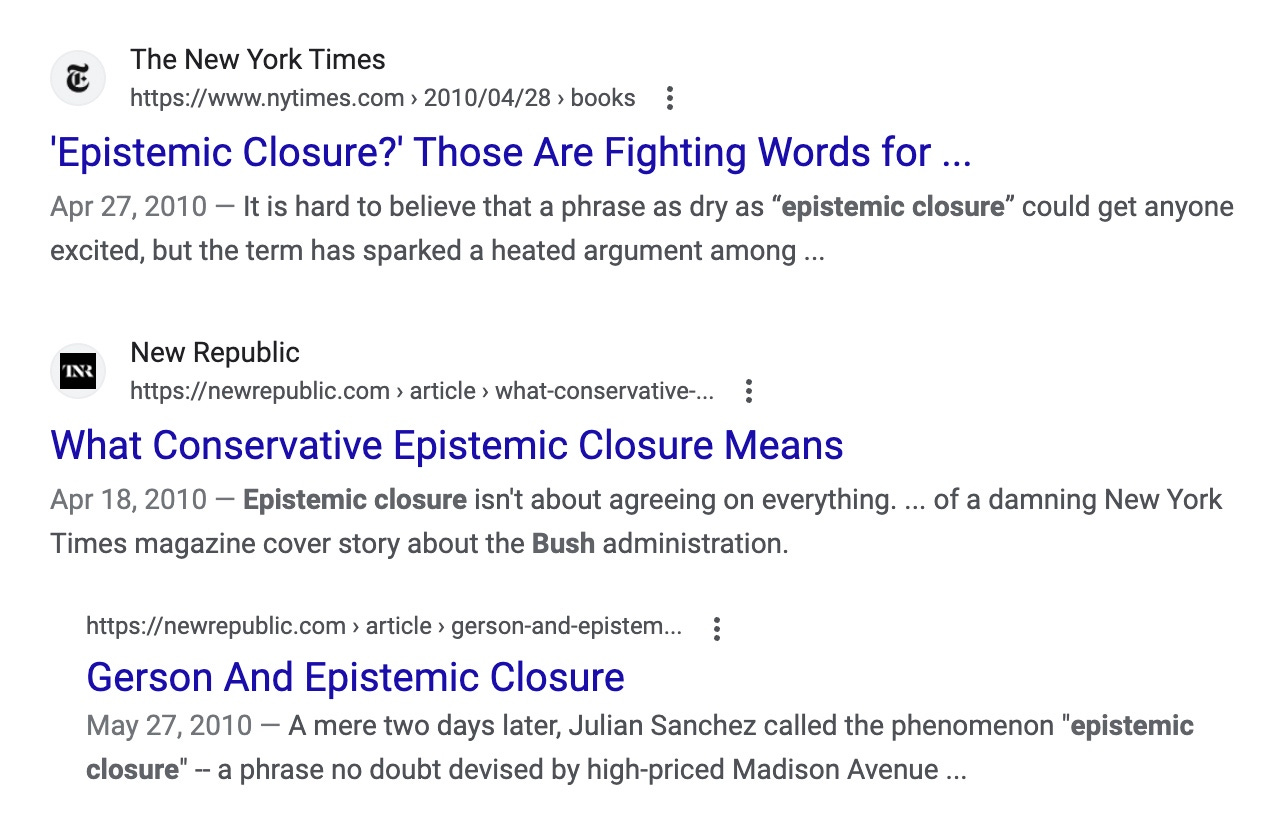Covering My Ears So Your Argument Turns Bad
do you see the red queen, raymond?
The Democratic Party’s go-to election lawyer, Marc Elias, is disturbed by the decline of Twitter:
Twitter used to work well, but now he receives negative comments, which means that it has stopped working. People can criticize him and express disagreement, so the platform is broken. If it worked, he would only be praised.
“Epistemic closure” had its pet rock moment in 2010, as the news media looked back on the George W. Bush years and the Iraq War and concluded that American neoconservatives had simply lost their ability to think.
And here are some mildly amusing later examples:
It was supposed to mean this:
It's rather about information, and what counts as evidence about the real world…if one only gets information from a narrow set of sources that feed back into each other but do not engage beyond themselves, that one will have a closed mind…regardless of what one does with that information.
And this:
Epistemic closure is a fancy term for the practice of defining – or redefining – reality in ways that support your pre-existing ideological preferences. Most of us think of it as “creating and living in a bubble.”
It was a fair enough point, as Bush watched sectarian brutality continue in post-Saddam Iraq and kept drawing the conclusion that everyone everywhere really yearns for democratic pluralism, honest elections, and a free press.
But that era’s epistemic closure is bush-league — sorry — compared to the sealed-in-a-jar-in-a-closed-box-in-a-deep-cave closure of the “mainstream” mind in 2023. If you’ve been on social media since roughly the night of November 8, 2016 and you’ve expressed disagreement with a politician, academic, or media figure, you’ve been a Russian bot, and Putin told you to say that. Criticism of institutions can’t simply arise from authentic grievances, or even from an authentically felt but misperceived grievance; rather, criticism is an op, a calculated string-pulling effort by manipulative forces. The far-right Putin-aligned Nazi grifters are tricking you into believing that you’re unhappy with the Biden administration. Your brain has been fooled by cognitive warfare, see?
Why did so many people react with what they thought was heartfelt emotion to Oliver Anthony’s “Rich Men North of Richmond,” a classic protest song that quickly started opening doors in a stultified discourse?
Here, let the New Yorker explain it to you:
The short time line around Anthony’s virality and the seemingly synchronized way in which right-wing pundits, such as Matt Walsh and Jack Posobiec, have tweeted enthusiastically and almost apocalyptically about “Rich Men North of Richmond” have turned the singer into a messianic or conspiratorial figure. Depending on your politics, he is either a voice sent from Heaven to express the anger of the white working class, or he is a wholly constructed viral creation who has arrived to serve up resentment with a thick, folksy lacquering of Americana….
What seems to be happening is that a handful of conservative media figures who trigger the libs for a living have realized there might be good money in offensive or obliquely political music. “Try That in a Small Town” and “Rich Men North of Richmond” could be seen, then, as the conservative-media machine’s attempt to create their own gangster rap through easily manipulated viral channels. Instead of the violence and misogyny of the nineteen-sixties conservatism that worried boomers, you now have reactionary nostalgia that pines for the days of sundown towns, and, apparently, when people who were overweight did not receive welfare benefits. (The violence is the same.)
So what seems to be happening is that a handful of figures have built a media machine to advance a wholly constructed viral creation, is the explanation. Go click on the link — go review the evidence presented in favor of this argument. Let me know if you can find it. Because otherwise the word “seemingly” is doing a lot of work in the claim about the “the seemingly synchronized way” in which “Rich Men” took off, isn’t it?
This is the “mainstream” mind in 2023: There are no authentic moments, no song that everyone suddenly loves because it so perfectly speaks to what they’re feeling. Somebody did that to your brain. They pulled your strings and made you helplessly seem to feel something that they told you to feel. What a warm and humane view of human connection, the soul and its Skinner Box.
Similarly, why are so many Americans drawing an emotional connection between their government’s endless support for Ukraine and their government’s poor response to a horrifying wildfire on Maui? Again, you’ve just been targeted by an op:
They seeded that in your brain, rube!
But here’s the effect of this maneuver: If you believe that people believe “fund Hawaii, not Ukraine,” you can address it. You can argue about it, argue against it, contextualize it, respond to it. If you know it’s just a cognitive trick seeded in the brains of the rubes, you preclude the ability to mount an effective response. There’s nothing to respond to; it’s just Angela Lansbury telling people to pass the time by playing a little game of solitaire, a trick and a con.
Over and over again, academics and politicians and media figures looking at society resort to teleological wishcasting rather than explanation. They’re losing a country they’ve never met, sitting in a mental basement and constructing their own shadows into something they feel pretty sure is a picture of the world.






This isn't hard.
Folks on the left see folks on the right as benighted, dishonest, boorish, morally inferior or some combination of these. They must do this to avoid engaging on the merits of a given argument. They love to borrow high sounding terms (epistemic closure) to add a pseudo-intellectual veneer to their statements. Ever heard of "stochastic terrorism"?
"They’re losing a country they’ve never met". Succinctly tells it all. Oliver Anthony sings a Dylan-esque ballad, and these people react like this?